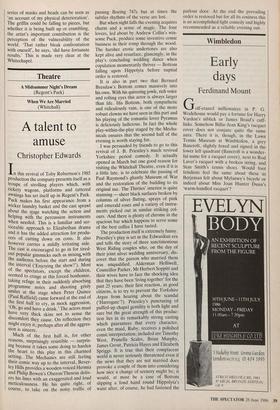Theatre
A Midsummer Night's Dream (Regent's Park) When We Are Married (Whitehall)
A talent to amuse
Christopher Edwards
In this revival of Toby Robertson's 1985 production the company presents itself as a troupe of strolling players which, with rickety wagons, platforms and tattered awnings has set itself up in Regent's Park. Puck makes his first appearance from a wicker laundry basket and the cast sprawl about the stage watching the action and helping with the percussion instruments when needed. This is a familiar and ser- viceable approach to Elizabethan drama and it has the added attraction for produ- cers of cutting down on costs. It also however carries a mildly irritating side. The cast is encouraged to go in for tired- out popular gimmicks such as mixing. with the audience before the start and during the interval (`Enjoying the show?'). Most of the spectators, except the children, seemed to cringe at this forced bonhomie, taking refuge in their suddenly absorbing programme notes and shooting grisly smiles at the stage when Peter Quince (Paul Raffield) came forward at the end of the first half to cry, in mock aggression, Oh, go and have a drink.' The actors must have very thick skins not to sense the discomfort they cause. On reflection they might enjoy it; perhaps after all the aggres- sion is sincere.
Much of the first half is, for other reasons, surprisingly resistible — surpris- ing because it takes some doing to harden theheart to this play in this charmed setting. The Mechanics are still feeling their comic way up to the interval, Bever- ley Hills provides a wooden-voiced Hermia and Philip Bowen's Oberon/Theseus deliv- ers his lines with an exaggerated and loud meticulousness. He his quite right, of course, to take on the noisy traffic of passing Boeing 747s but at times the subtler rhythms of the verse are lost.
But when night falls the evening acquires charm and a sense of magic. The four lovers, led about by Andrew Collin's win- some Puck, produce some inventive comic business in their romp through the wood. The harsher erotic undertones are also kept alive and resurface, glancingly, in the play's concluding wedding dance when copulation momentarily thrives — Bottom falling upon Hippolyta before nuptial order is restored.
It is also in part two that Bernard Bresslaw's Bottom comes massively into his own. With his quivering jowls, rich voice and rolling eyes this actor is always larger than life. His Bottom, both sympathetic and ridiculously vain, is one of the more robust clowns we have seen in this part and his playing of the romantic lover Pyramus is deliciously ludicrous. In fact the whole play-within-the-play staged by the Mecha- nicals ensures that the second half of the evening is worth staying for. I was persuaded by friends to go to this revival of J. B. Priestley's much revived Yorkshire period comedy. It actually opened in March but one good reason for visiting the Whitehall Theatre, even if it is a little late, is to celebrate the passing of Paul Raymond's ghastly Museum of War and the restoration of the building to its original use. The Thirties' interior is quite stunning — sheer black surfaces broken by columns of silver fluting, sprays of pink and emerald roses and a variety of instru- ments picked out in similar striking col- ours. And there is plenty of chrome in the spacious bar which happens to serve some of the best coffee I have tasted.
The production itself is extremely funny. Priestley's play is set in the Edwardian era and tells the story of three sanctimonious West Riding couples who, on the day of their joint silver wedding anniversary, dis- cover that the parson who married them was unqualified. Alderman Helliwell, Councillor Parker, Mr Herbert Soppitt and their wives have to face the shocking idea that they have been 'living together' for the past 25 years: their first reaction, as good citizens, is to try to prevent the Yorkshire Argus from hearing about the scandal (`Harrogate'?). Priestley's puncturing of puffed-up chapel gentility is both light and sure but the great strength of this produc- tion lies in its remarkably strong casting which guarantees that every character, even the maid, Ruby, receives a polished comic interpretation; included are Timothy West, Prunella Scales, Brian Murphy, James Grout, Patricia Hayes and Elizabeth Spriggs. It is true that their complacent world is never seriously threatened even if the news that they are not married does provoke a couple of them into considering how nice a change of scenery might be; it would, at most be a case of Bottom slipping a fond hand round Hippolyta's waist after, of course, he had fastened the parlour door. At the end the prevailing order is restored but for all its cosiness this is an accomplished light comedy and highly recommended as a reliable evening out.


















































 Previous page
Previous page